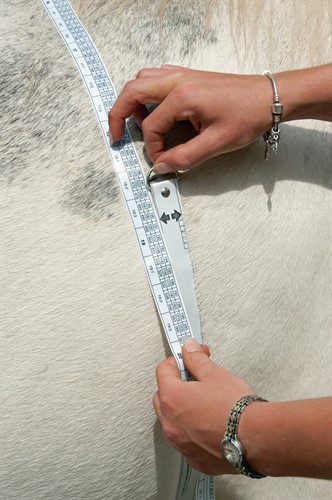
Weight loss is a common concern among horse owners. Cold temperatures demand more energy for the horse to maintain body temperature and stay warm. It’s especially challenging for senior horses and young foals, who have a harder time maintaining body temperature. Other horses may lose weight if hay and/or pasture quality is poor and insufficient supplemental energy is consumed. Providing proper nutrition and exercise can help remedy loss of condition.
Cold Increases Energy Needs
Cold temperatures have the effect of increasing the amount of energy a horse burns to keep warm. It is estimated that horses have a lower critical temperature (LCT) of 30-50oF, depending on length of hair coat and general body condition. Below the LCT, a horse needs to burn energy to keep warm.
For every 10oF the temperature drops below LCT, a horse needs approximately 2,000 extra kilocalories (kcal) to maintain body temperature. Often, this can be achieved with an extra 2-3 pounds of hay. However, when rain and wind are factored in, this increase in energy quickly grows to more than that which can be supplied by hay alone. (Note that hay is the best option for warmth. Hay is fermented in a part of the hindgut called the cecum. Heat is a byproduct of fermentation, which helps the horse stay warm!) In this case, fat supplements are a great option to supply a lot of calories without a lot of bulk. For example, 1 pound of ULTIMATE FINISH™ 25 will provide approximately 1,700 kcal.
Body Condition & Weight Monitoring
When spring arrives, and throughout the year for that matter, it is important to assess body condition. We have a body condition score chart on the BUCKEYE Nutrition site if you need help assessing.
A weight tape, placed around the horse’s barrel, directly behind the shoulders as the horse stands square, is an excellent tool for helping to estimate weight and monitor change. Measuring is important. You will often see changes in a measurement before noticing changes visually. Weigh regularly – for example the first day of every month or each time the horse’s hooves get trimmed. Keep a log so you can track weight fluctuations and adjust the diet accordingly.
Diet for Weight Gain Basics
Forage, in one form or another, is the basis for every horse’s diet. Fiber needs to have some length to it – about 2 inches – in order to help food move through the digestive tract normally. For horses with dental concerns who may not be able to chew or consume hay, substitutes like soaked hay cubes, chopped forage and soaked beet pulp often work well. Forage should make up no less than 50% of the entire diet; ideally, it should make up 70-100%, depending on the horse’s needs.
An underweight horse will need to consume more calories than he burns in order to gain weight. Weight gain should be slow and controlled. Rapid weight gain with improper diet can cause problems, so it’s important to take your time and do it right. Forage alone may not have enough calories for significant weight gain, so grain concentrates and/or fat supplements can help.
In any case, to achieve an increase of one body condition score (i.e. from a 3 to a 4), the average adult horse needs to gain 44-50 pounds (NRC 2007). That amount of gain can take 30-60 days, so patience is needed. The amount of increased feed in the diet will depend on the individual horse, overall health and activity level. And, of course, any increases in feed should be added slowly to allow the digestive tract to adjust. Adding three or more feedings to spread out larger grain meals is a great option as well.
High fat grain concentrates, such as CADENCE™ Ultra and EQ8™ Senior, are ideal for encouraging weight gain. Supplements, such as ULTIMATE FINISH 25, are excellent for adding calories without adding a lot of volume to meals.
For horses with metabolic concerns, such as Equine Cushing’s Syndrome or Equine Metabolic Syndrome (EMS), who also need to gain weight, a high fat, low carbohydrate diet is ideal. Select a grain concentrate with no more than 12-14% non-structural carbohydrates that contains 8-12% fat. For example, try SAFE ‘N EASY™ Senior or SAFE ‘N EASY™ Performance.
A supplement like ULTIMATE FINISH 100 provides fat calories with no carbs. Unlike carbohydrates, fat supplies calories without increasing insulin concentration. Hence the reason fat is a good energy source for horses with metabolic concerns. Pasture grazing may need to be limited with a grazing muzzle or turnout on a dry lot. Hay may need to be soaked to reduce dietary carbohydrates as well. Soaked hay, a high-fat, low carbohydrate grain ration, plus an additional fat supplement often suits these horses well. A qualified nutritionist can help you build the proper mix of feed and ensure nutrient needs are met.
Summary
Remember, it is important to ask why a horse may be thin to begin with. Is the diet properly balanced? Is it health related? Is the horse stressed (for example, is he being bullied in the paddock)? Have your veterinarian conduct a wellness exam at least once per year. Take stock of the horse’s environment and behavior – what may have changed? Contact one of BUCKEYE™’s expert equine nutritionists for help creating a diet that will help your horse safely gain weight.
References:
Dugdale, A., Grove-White, D., Curtis, G., Harris, P., Argo, C. 2012. Body condition scoring as a predictor of body fat in horses and ponies. The Veterinary Journal. 194(2): 173-178.
eXtension.org, Winter Care for Horses. https://articles.extension.org/pages/25673/winter-care-for-horses
Henneke, D.R., Potter, G.D., Kreider, J.L., Yeates, B.F. 1983. Relationship between condition score, physical measurements and body fat percentage in mares. Equine Veterinary Journal. 15(4):371-372.
National Research Council 2007. Nutrient Requirements for Horses, 6th Edition. National Academies Press, Washington, DC.